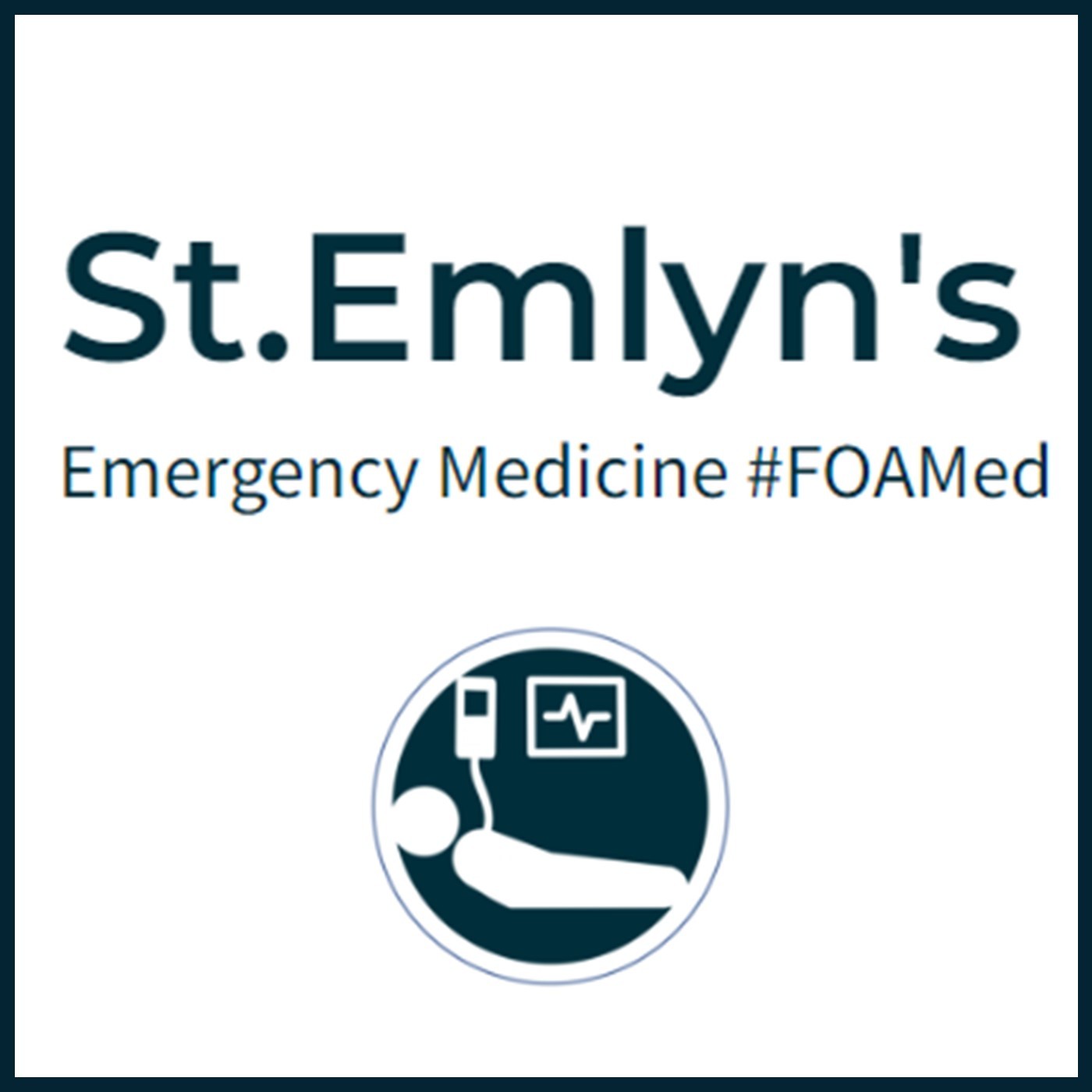
1.3M
Downloads
288
Episodes
A UK based Emergency Medicine podcast for anyone who works in emergency care. The St Emlyn ’s team are all passionate educators and clinicians who strive to bring you the best evidence based education. Our four pillars of learning are evidence-based medicine, clinical excellence, personal development and the philosophical overview of emergency care. We have a strong academic faculty and reputation for high quality education presented through multimedia platforms and articles. St Emlyn’s is a name given to a fictionalised emergency care system. This online clinical space is designed to allow clinical care to be discussed without compromising the safety or confidentiality of patients or clinicians.
A UK based Emergency Medicine podcast for anyone who works in emergency care. The St Emlyn ’s team are all passionate educators and clinicians who strive to bring you the best evidence based education. Our four pillars of learning are evidence-based medicine, clinical excellence, personal development and the philosophical overview of emergency care. We have a strong academic faculty and reputation for high quality education presented through multimedia platforms and articles. St Emlyn’s is a name given to a fictionalised emergency care system. This online clinical space is designed to allow clinical care to be discussed without compromising the safety or confidentiality of patients or clinicians.
Episodes

Friday Feb 27, 2015
Ep 40 - Opiate overdose in the ED
Friday Feb 27, 2015
Friday Feb 27, 2015
Managing Opiate Overdoses: Key Insights from St Emlyns
Opiate overdoses are a common and critical issue faced in emergency departments, especially in urban areas with prevalent drug use. This guide, based on insights from Dr. Simon Carley and Dr. Iain Beardsell, provides an in-depth look at recognizing, treating, and managing opiate overdoses, including potential complications and best practices for patient care.
Recognizing Opiate Overdoses
Patients present with opiate overdoses either accidentally or intentionally, including drug addicts, elderly patients overdosing on prescriptions, and those attempting self-harm. Recognizing an overdose involves identifying key symptoms:
- Depressed Level of Consciousness: Patients may appear lethargic or unresponsive.
- Respiratory Depression: A significantly reduced breathing rate.
- Myosis: Pinpoint pupils that are unresponsive to light.
- Cardiovascular Effects: In severe cases, patients may exhibit hypotension or bradycardia.
Initial Assessment and ABC Protocol
In cases of suspected opiate overdose, the initial assessment should follow the ABC (Airway, Breathing, Circulation) protocol:
- Airway: Ensure the airway is open and clear.
- Breathing: Assess and support breathing and ventilation as necessary.
- Circulation: Check for adequate blood pressure and oxygen saturation. Establish IV access for medication administration.
Administering Naloxone
Naloxone, an opiate antagonist, is the primary antidote for opiate overdoses. However, its administration must be cautious and titrated to avoid complications like acute withdrawal or revealing underlying conditions, such as stimulant overdoses.
Methods of Administration
- Intravenous (IV): Offers rapid onset, but should be administered in small aliquots (e.g., 100 micrograms) to prevent abrupt awakening and associated risks.
- Intramuscular (IM): Useful when IV access is challenging, though it has variable absorption rates.
- Intranasal (IN): Effective, especially in patients with adequate spontaneous respiration.
- Nebulized Naloxone: Useful for patients who are breathing but not fully responsive, allowing gradual titration.
Managing Long-Acting Opiates
Patients who have ingested long-acting opiates, such as methadone, require careful monitoring. Continuous naloxone infusion may be necessary to prevent re-sedation. The infusion rate should typically be two-thirds of the total dose needed to achieve the initial response.
Importance of Monitoring
Patients should be placed in a setting where continuous monitoring of ventilation can be performed. Suitable locations include:
- High Dependency Unit (HDU): For intensive monitoring.
- Acute Medical Unit (AMU): For stable patients needing continuous observation.
Advanced Monitoring Techniques
End-tidal CO2 monitoring can provide a continuous assessment of respiratory status, especially when high-flow oxygen is used, which can mask hypoventilation.
Addressing Concurrent Conditions
Opiate overdoses often coexist with other medical or substance-related conditions. Be vigilant for:
- Rhabdomyolysis: Caused by prolonged immobility, leading to muscle breakdown.
- Compartment Syndrome: Particularly in patients found unconscious for extended periods.
- Mixed Overdoses: Patients may also have ingested other substances like stimulants or tricyclic antidepressants, complicating treatment.
Psychosocial Considerations and Follow-Up
Patients presenting with opiate overdoses often have complex psychosocial needs. It is crucial to address these issues, including:
- Mental Health Assessment: Evaluate for deliberate self-harm and provide psychiatric support.
- Drug and Alcohol Services: Connect patients with support services for addiction.
- Homelessness Support: Involve homeless outreach teams as necessary.
Handling Recurrent Overdoses
It's not uncommon for patients to return with repeated overdoses, reflecting the chronic nature of addiction. While frustrating, healthcare providers must consistently offer support and care, recognizing that patients have autonomy in their choices.
Controversies and Emerging Practices
Recent case reports suggest potential benefits in ventilating hypercapnic, acidotic patients before administering naloxone to avoid complications like flash pulmonary edema or dysrhythmias. However, this practice remains controversial and requires careful risk-benefit analysis.
Case Study Insight
A notable case involved a pregnant patient with an opiate overdose who also had ingested cocaine and tricyclic antidepressants. Administering a high dose of naloxone precipitated severe withdrawal and unmasked the effects of other substances, leading to a critical situation. This highlights the importance of a controlled and gradual approach to naloxone administration.
Conclusion
Effective management of opiate overdoses in the emergency department requires a nuanced approach. This includes recognizing the signs, following the ABC protocol, and carefully administering naloxone. Continuous monitoring, addressing underlying conditions, and providing psychosocial support are crucial for comprehensive care. Stay informed on emerging practices and best practices to enhance patient outcomes. For more detailed guidelines and updates, follow the St Emlyns blog and join our discussions on emergency medicine best practices.

No comments yet. Be the first to say something!